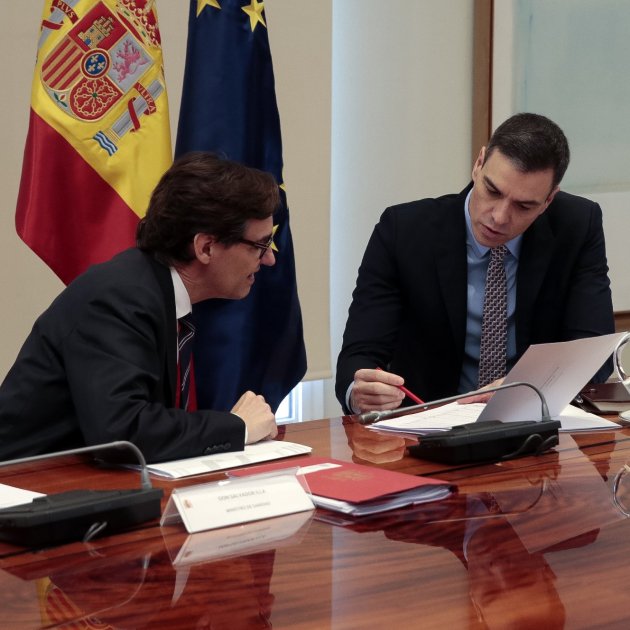The Spanish government sees that the parliamentary majority it has had up till now in votes related to the country's grave coronavirus crisis is in danger. Given this situation, the Sánchez administration has put all hands on the pumps. Moments after prime minister Pedro Sánchez had called opposition leader Pablo Casado (PP), to try to retain his votes, it was health minister Salvador Illa who also sent off a warning: "Better not to try experiments that could lead us to chaos." For that reason, he again called for the country's state of alarm to be maintained since this instrument, which permits the government to take emergency powers under the constitution, has "worked". Transport minister José Luis Ábalos also added his own cautionary message, asserting that it was "not a whim of this government" and warning the opposition that they would be responsible for a hypothetical "rise in contagion". All this on the first official day of Spain's easing of lockdown, with all parts of the country moving into, at least, Phase 0 of the four-stage plan to reach "a new normality".
This Wednesday, in Congress, Sánchez will ask for yet another fortnightly extension of the state of alarm. But every time, the political pickings get slimmer. This time up, he starts without even the guaranteed support of two of his partners, ERC and the PNV, Catalans and Basques respectively, who demand an end to the single command which has managed the response to the crisis centrally, and the return of powers to Spain-s autonomous communities. He also lacks the support of the main opposition party, which supported the three previous extensions.
Today, the "bad cop" role was performed by transport minister Ábalos, who addressed Pablo Casado directly from the government's Moncloa palace press room. The minister demanded that the leader of the opposition not allow himself to be "dragged" by the far/right Vox. If they do, he warned, "they will have to answer to the people if there is a rise in infections." And he broadened his call, directing it at all those who might "fail to understand". They would all have to "take responsibility", he said.
Ábalos questioned why anyone would not want to retain the "most effective" tool for dealing with the pandemic. "If the start of the deconfinement could lead to a new outbreak, although hopefully it won't, we need to preserve this instrument for a little longer," he said. The government did not expect "blank checks", he said, but there were no other options to the state of alarm: "What other alternative is there but chaos and disorder?"
That word, "chaos", was also used by the health minister, who reiterated his message of recent days: "The state of alarm has been a constitutional instrument that has worked." He noted that this prerogative had made it possible to move from a situation of daily rises of 35% in new confirmed cases to an increase of 0.16% today. "It is essential to have the state of alarm" during the easing of lockdown, he said. This is because it would make it possible to deal with any new waves of the virus and to restrict traffic as before. And he sent a warning: "Better not to try experiments that could lead us to chaos."
"I don't want to be an alarmist, but imagine if the state of alarm were defeated, what would happen the next day? Everyone would have to restart their [work] activity", warned Ábalos. He said that "no one has put forward an alternative plan that is forceful enough." And he added, "They don't propose one because there aren't any."
Appeal to patriotism
The transport minister also appealed to patriotism and the idea of Spain. "This is support for Spain, it is not support for the political agenda of this government or the forces that make it up," said the Socialist politician, stating that "we didn't have this in any electoral programme." He criticized that "it is not legitimate to force a government into a corner" in a way that the "citizens end up paying for it." And he concluded with a message: "This is a measure for the benefit of Spain."
